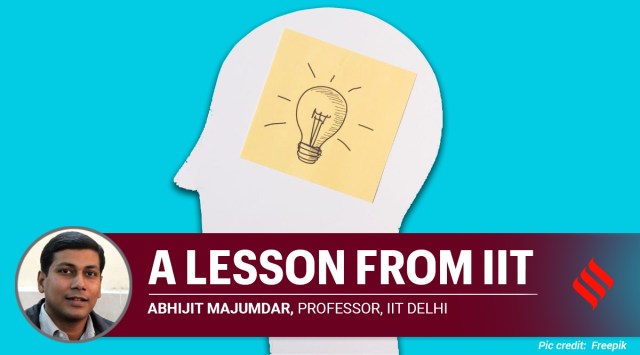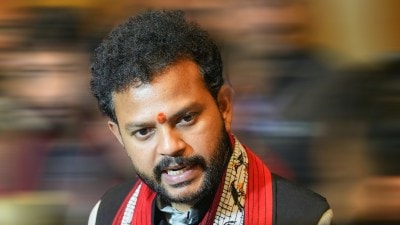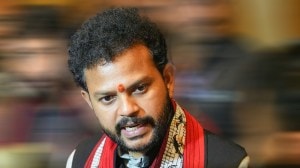How the IITs produce critical thinkers and high-quality human resources, IIT Delhi professor explains
"Students at IITs are not indoctrinated; they are encouraged to disagree with the conventions of the subjects. This practice often germinates ideas or questions which even the professor has not come across during his or her academic career," writes Majumdar
 Some of the students lose their zeal for engineering after joining IITs. (Graphics by Angshuman Maity)
Some of the students lose their zeal for engineering after joining IITs. (Graphics by Angshuman Maity) (‘A Lesson from IIT‘ is a weekly column by an IIT faculty member on learning, science and technology on campus and beyond. The column will appear every Friday.)
IITs often face the following question: How many of these premier institutions pioneered commercially successful technological innovations?
One can argue about the answer and even begin listing out examples, but my response to this issue is slightly different. I would say that IITs have been striving to generate critical thinkers and high-quality human resources since their inception.
Professor J C Ghosh, the first director of IIT Kharagpur, visited many European universities in 1950 and invited eminent scientists and technologists to be associated with the institute in its formative years. The principles adopted then still hold true.
While it is a fact that most of the students admitted are very good learners, the IIT system deserves due credit for nurturing these talents and providing an ecosystem to catalyse the learner-to-thinker transition.
When new faculty members enter the IIT system, they face a lot of queries about their research area. This is an indication that research is given primacy in these institutions; being a potentially good teacher is not a sufficient condition to get a faculty position.
Innovation, an outcome of research, often comes from people who work in different but analogous fields. Therefore, professors who have different academic and research backgrounds bring divergent thinking not only to the departments but to the IIT system as a whole.
A similar diversity is in existence in the academic curriculum as well. A close look at the curriculum will reveal that around half of the credits required to earn an undergraduate degree come from the core engineering courses, while the rest comes from basic science, basic engineering, biology, environmental science, humanities and management courses.
Besides this, a student interested in areas that are distant from his or her program can register for open elective courses offered by other departments, centres and schools. Thus, it is a common phenomenon in IITs that a student majoring in chemical or civil engineering is pursuing a basket of courses or even a minor degree in computer science or in management. To complement this flexible academic framework, there are various clubs focussing on robotics, aeromodelling, astronomy, economics and others that encourage students to work on practical
problems.
Most institutes utilise their resources to cover the syllabus, while IITs take pride in uncovering them so that the concepts remain engraved in the mind of students. Undue emphasis on covering codified content can limit the creativity of students by constraining their thought-process.
Uncovering the syllabus opens up the entire horizon of subjects through reflection, conceptualisation, analysis and synthesis.
Students at IITs are not indoctrinated; they are encouraged to disagree with the conventions of the subjects. This practice often germinates ideas or questions which even the professor has not come across during his or her academic career.
One of the advantages of IITs is that most of the professors are active researchers having first-hand experience with scientific and social problems. Albert Einstein had once said, “It is not that I am so smart, it is just that I stay with the problems longer.” This idea continues to be applied at IITs.
Therefore, after dwelling on a research problem for years, maybe even for decades, IIT professors can tease the students intellectually by posing some research-oriented questions during interactions. A maverick student often likes these open-ended questions which can have multiple sub-optimal answers rather than a unique solution.
In such a scenario, “ignorant certainty”, a belief that espouses that there is one and only one right answer to every question, is challenged. Sometimes, these exchanges encourage the students to delve deeper into scientific, social and environmental issues by opting for summer or winter projects.
Some of the students lose their zeal for engineering after joining IITs. For others, it was never their interest, but peer, parental or societal pressure that would have driven them to IITs.
Moreover, with the growing interest in Artificial Intelligence and Machine Learning, the focus of students in core engineering disciplines is on the wane. It is posing serious challenges to some of the academic units dealing with traditional engineering areas.
However, the flexibilities of the IIT system and curriculum ensure that the students have the leeway to pursue their academic dreams. Students disillusioned with engineering often find the complex social problems involving gender, untouchability, inclusion, and economic disparity to be more enticing to work with. The strong presence of humanities, public policy and management departments help such students to pursue their real interest through courses (graded and non-graded) and projects.
There is no denying that only a part of learning happens inside the classrooms of IITs and the rest happens in hostels, libraries, cafeterias and other places through peer learning. Many ideas of successful start-ups have actually originated from the not so cosy confines of hostel rooms. Most of the IITs provide support and mentorship through incubation centres so that students can transform their ideas into tangible products and business models
Whether we like it or not, IIT hostels become vibrant when the entire country goes into a deep slumber and vice versa. This often leads to poor attendance of students in the class, however, we should not grumble as long as the students don the thinking cap on their heads.
The writer is Chair Professor for Decision Sciences, IIT Delhi
- 01
- 02
- 03
- 04
- 05
































